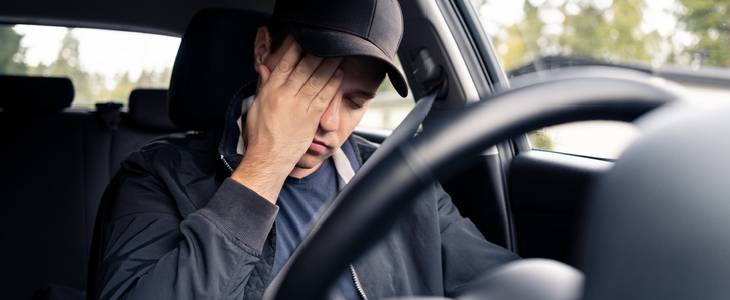It appears that certain forms of reckless driving are more stigmatized than if someone is driving while drowsy (for example, drunk driving). In fact, people are often praised for working long hours or even sacrificing hours of sleep in favor of being productive. Unfortunately, individuals often get behind the wheel even though they might be too tired to drive carefully on the roads. Research shows that both drunk driving and drowsy driving pose very similar threats in terms of risk of injury to pedestrians, other drivers, and themselves.
According to the National Highway Traffic Safety Administration (NHTSA), thousands of accidents each year are caused by drowsy driving. They estimated that as of 2022, there were 100,000 police-reported collisions and over 1,500 deaths as the result of drowsy driving each year. In addition, more than 40% of drivers admitted they had fallen asleep behind the wheel. These figures are believed to be underestimated though, as drowsy driving can be difficult to detect after the accident has occurred. Texas is one of the states with a large number of road miles and drivers, so the incidence might be higher than in smaller states. The Texas Department of Transportation can provide local research for up-to-date and specific statistics.
Consequences of Drowsy Driving
- Accidents: Drowsy driving is responsible for a significant number of vehicle collisions. These accidents can range from minor fender-benders to fatal collisions.
- Physical Harm: Due to reduced reaction times and impaired judgment, drowsy driving collisions can be severe, leading to injuries or fatalities.
- Economic Costs: Collisions result in monetary costs, including medical bills, vehicle repair or replacement, and increased insurance premiums.
- Legal Consequences: If it is determined that a driver was operating a vehicle while drowsy and caused an accident, they could face legal penalties, fines, and even imprisonment, especially if the accident results in serious injury or death.
- Mental and Emotional Impact: Being involved in an accident, especially if it results in injury or the loss of life, can have lasting psychological effects on the driver, including guilt, anxiety, depression, and post-traumatic stress disorder (PTSD).
Drowsy driving is a serious issue, and public health campaigns frequently emphasize the importance of getting adequate sleep before driving and recognizing the signs of drowsiness to prevent accidents. As reported fairly recently, Texas is one of the few states, along with Massachusetts, California, Alabama and Florida, to have weeks or days dedicated to spreading awareness of drowsy driving and how to identify the signs of driving while drowsy. Although these campaigns might not carry the force of law, they do underscore the seriousness of the issue.
Although Texas does not have specific laws that make drowsy driving a stand-alone criminal offense, there are several points to consider:
- General Civil and Criminal Laws: Even though there might not be a specific law addressing drowsy driving, if a drowsy driver causes an accident, they can still be held liable for negligence. Texas law requires drivers to operate their vehicles with due care. If a driver fails to do so because they were too fatigued to drive safely, they could be held liable for any damages or injuries they cause. A driver who causes an accident because they were driving while drowsy could also face criminal charges. These could range from reckless driving or endangerment to vehicular homicide or manslaughter if someone is killed as a result.
- Commercial Drivers: Commercial drivers, such as those driving 18-wheelers or buses, are subject to federal regulations regarding hours of service. These regulations are designed to prevent fatigued driving among professional drivers. Violations of these regulations can result in penalties for both the driver and their employer. A professional driver might even face employment consequences, such a termination if they are found to have been driving while fatigued and it resulted in an accident.
- License Suspension or Revocation: In some places, causing an accident due to drowsiness could lead to the suspension or revocation of one’s driver’s license, especially if it is a recurring issue, or if the consequences of the accident were severe.
- Insurance Ramifications: If it is determined that a driver was at fault for an accident due to drowsiness, their insurance rates might increase. Additionally, it is possible that some or all of the damages might not be covered depending on the terms of their insurance policy.
- Educational or Remedial Programs: Some jurisdictions may require drivers who have been involved in drowsy driving accidents to attend educational or remedial driving programs.
It is worth noting that proving drowsiness as a primary factor in an accident can be challenging, as there is no standard test for drowsiness like there is for alcohol intoxication. However, evidence such as eyewitness testimonies, surveillance footage, or an admission from the driver can play a role in determining whether drowsiness is a contributing factor.
Takeaway
Given the growing awareness of the dangers of drowsy driving, it is possible that specific laws could be proposed or implemented in the future in Texas. If you have been involved in an accident involving drowsy driving and feel that you might need to consult an attorney, contact Ceja Law Firm, PLLC. We can provide an initial complimentary consultation to determine if legal representation would be appropriate and in your best interest.










